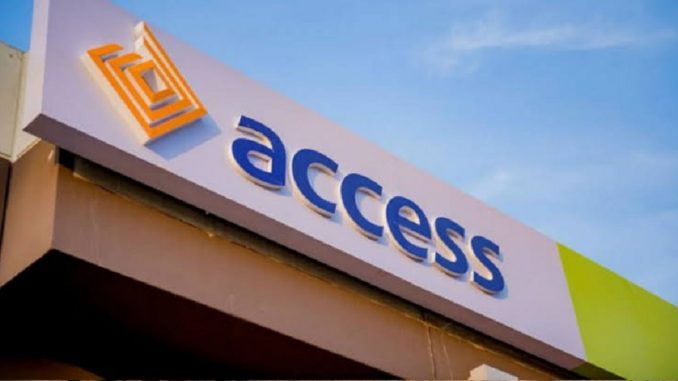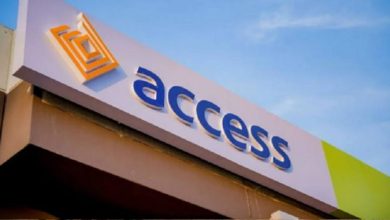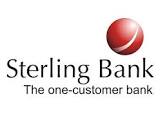Access Bank Holdings – Breaking The Hard Nuts With Iron Teeth To Stay On Top.

In the last financial year as it is in the current one ,the competitive space in the banking industry has been paved with critical but hostile and hard policies, setting up the industry for failure . But Access Bank has ,no doubt, lived up to the stakeholders expectations ; it expolited the available opportunities with dexterity and neutralized some threats to emerge one of the most valueable banks in the financial industry as it created better value for money for its stakeholders in the first nine months of 2024 compared to the corresponding period of 2023 in key performance indicators.
But the bank achieved this feat amidst an inclement operating environme .No doubt , the ongoing financial year poses a lot of herculean situations that put some corporate leaders at their wit end. A look into the operating environment confirms this as much .With global markets locked into uncertainty caused by geopolitical tensions, supply chain reconstruction, and economic realignments, banks globally have had difficulties navigating the international and local business environments. African banks have equally had to cope with foreign exchange volatility and worsening counter party conditions, while in Nigeria, banks have had to handle restrictive monetary policy as the Central Bank of Nigeria (CBN) tries to tackle raging domestic inflation.
Most importantly, with the elevated inflation, the Central Bank of Nigeria ,CBN ,while trying to keep the policy rate higher in a way that stretches the capacity of borrowers to repay debt .Fiollowing the increase in the MPR or interest rate from 18.75per cent to 27.25 per cent, the banking sector average maximum lending rate rose to 30.21 per cent in September 2024, the highest since 2022
Banks are also required to exercise utmost prudence and set aside the FCY revaluation gains as a counter-cyclical buffer to cushion any future adverse movements in the FX rate. In this regard, banks shall not utilize such FX revaluation gains to pay dividends or meet operating expenses.
The excessive inflation rate has led to an overheated economy with weak purchasing power and poor saving capability of the entire populace . Higher interest rates are expected to boost banks’ net interest income—resulting in higher net interest margins (NIMs) and enhanced profitability as lenders are expected to benefit from a widening of the spread between the interest they pay to depositors, and the income they reap on lending . But the rise in rates could also lead to slower loan growth, asset-quality pressure, a weakening of funding and liquidity.
However , how Access Bank battled the above threats to exploit available opportunities also confirms the unusual pedigree of its leadership. To effectively compete, Access Bank has a tradition of adjusting its internal strengths to the environmental opportunities. Its managers in the last few years have continued to identify, combine, re-combine, and manage their resources, competencies and capability to explore its potential and perform competitively on the customer needs, preferences ,and desires satisfaction. So, its advantage consists in identification of the internal core competences, mainly based on knowledge assets and intellectual capital that align with the key success factors of the market that delivers competitive advantage, better performance and better market position.
The result of the above is very clear in the 2024 financial year : When you peep hard into the interior workings of this bank some big facts stare you in the face :impressive loan asset quality , adequate bank’s loan to deposit ratio (LDR), decreasing bank’s non-performing loan ratio (NPLR), ability to collaborate with fintech companies to improve the bank’s customer’s service experience and service interface , decreasing cost of funding and cost of risk (CoR); and steadily decreasing cost-to-income ratio (CIR .
The same strategic tendency worked for the bank to battle the certain threats that confronted the industry in the first nine months of 2023 . As indicated above, key threats to success in banking business or management are risk and the ever growing cost management. Ironically , without taking and managing those risks involved it is impossible for any player in this industry to be profitable in the real sense of it or to outperform competition.
In other words, bank management is coterminous with risk management , and this where the boys are separated from the men in this industry. The leadership of Access Holding,indeed, has a large heart for risk deploying the biggest volume of loans and expanding across the African continent in a big way . But it is not only taking those risks, it is also creating critical values for all its stakeholders, deploying resources to create competencies.
In the first nine months of 2024, Access Holding has not put any stakeholder in doubt regarding its capability to deliver better value for money for its shareholders, satisfying the depositors and borrowers with maximum liquidity, displaying strong credit quality required by the regulatory authorities as well as living up to the expectations of the operating community at large .
Delivering Adequate Returns to its Shareholders.
Despite the above inclement environment ,Access Holdings, one of the leading financial institutions in Nigeria and one of the five largest commercial banks in the country, has remained resilient turning adversity to success ; it has maintained a steady growth profile , breaking the macroeconomic hard nuts with iron teeth to stay on top in some critical areas .
Indications to the recent impressive performance came from the bank’s performance at the end of 2023 financial year. Indeed , the year 2023 was a fantastic year for this tier 1 bank.The group’s financial performance throughout the year was equally commendable, with a recorded net income of N250.4 billion in the nine months ending September 2023. This signifies an 83% year-on-year growth from the corresponding period in 2022.
The stock marketconfirmed it as well ..Ending 2023 with a closing share price of N23.15 and a market capitalization of N822.9 billion, Access Holdings achieved an impressive yearly gain of 172.4%.
The current financial year,analysts believed, has shown it is not going to be different despite the fact that it is more challenging.By hauling up net interest income by 116.8 % at the end of the ninth of 2024 to N844.84 billion from N389.74 billion, ACCESS Bank showed that it could squeeze water out of a stone . Its revenue grew phenomenally 114.5 percent to N3.4trn billion from N1.6trn .The bank achieved a massive income from its non interest income segment as it grew by 87% from NGN545.3 billion to NGN1 trn .But the impressive performance was achieved amidst certain critical challenges.
One thing that set it apart from the crowd is its capability to create competitive values for its shareholders and achieve a phenomenal growth within the shortest period of time.
The reason for the above may not be far to seek . A critical success factor or constituency that no bank could compromise is the shareholders satisfaction. Shareholders require maximum or adequate returns on their investments in order to remain invested in the bank and to be willing to continue to provide additional resources and when needed.The first signal that confirms Access Holding capability in this constituency is its ability to generate the biggest revenue as it continues to build resources and deploy them to create competencies where it matters most .
Gross earnings
Access Bank was able to navigate the banking terrain to get the results because it was ‘able to exploit the opportunities within the environment and minimize certain threats standing to hinder the exploitation of the available opportunities.
In the nine months under review, Access Holdings, which is the parent company of Nigeria’s largest bank by asset, revealed that its gross revenue rose by 114.5 per cent year-on-year from N1.6tn in 2023 to N3.4tn in 2024, the biggest among its peers in the last nine months.But one thing is to generate revenue, another thing is to convert it efficiently to profit . Access Holding did this dutifully in the current financial year.
Profitability
In the first nine months of 2024 every player has been confronted with three key threats . These include the rising interest expenses ,operating expenses and high potential for credit risks empowered by high interest rate operating environment and skyrocketing inflation rate.
However , despite the threats from interest and operating expenses and large of impairment that moved to clip its profit momentum in the first nine months of the financial year, Access Bank survived in absolute terms with capability to generate massive revenue that greatly outpaced expenses. Consequently, its profitability remains highly impressive.
The rising revenue numbers robbed off on pretax profits, growing it 89.6% percent to N558.2 billion from the former attainment of N294.4billion.It also helped to fork up net profit 82.8% percent to N 457.8 billion from N 250.4 billion.
The bank was able to wring better margins from improved profits as per-tax profits rose to 16.3 percent from 11.3 percent while net profit margin grew to 13.4 percent from 9.7 percent.
To cement its place as the most profitable bank, return on equity (ROE), and return on assets (ROA), stood to 22 per cent and 1.8percent respectively
The impressive of Access Holdings is equally confirmed by earnings per share at the end of September, 2024 . A good way to determine earnings to the investor is the Earning Per Share (EPS), which is the monetary share value, i.e., what every share issued by the bank will receive from declared earnings. The higher the EPS, the more profitable the bank is. Nine months EPS for Access Bank comes to about 4.79 per share, as compared to 3.18 . This means that investors holding shares of Access get better value for their money in 2024 .
Though the year 2024 has been more challenging than 2023 financial year, Access Bank has proved it has what it takes to sustain the high confidence reposed on it by its stakeholders .
Impressive Stock Performance.
Stock investors can confirm this assertion without any controversy .The current share price of Access Holdings Plc (ACCESSCORP) is NGN 24.65. ACCESSCORP closed its last trading day (Friday, November 8, 2024) at 24.65 NGN per share on the Nigerian Stock Exchange (NGX), recording a 1% gain over its previous closing price of 24.40 NGN. It began the year with a share price of 23.15 NGN and has since gained 6.48% on that price valuation, ranking it 85th on the NGX in terms of year-to-date performance. Analysts believed shareholders could be optimistic about ACCESSCORP knowing the stock has accrued 25% over the past four-week period alone—eighth best on NGX . This performance suggests strong investor confidence and positive sentiment towards the stock, primarily based on its financial performance.
At its last price of ₦24.65, its market capitalization stood at ₦848.9b while shareholders return performance was 42.1% in the last one year .
Analysts believed possessing Access Bank stock is highly rewarding with Price-To-Earnings ratio (1.1x) that is below the NG market (7.7x) , with Earnings grew by 203.6% over the past year , with the bank paying a high and reliable dividend of 9.13 and the sock trading at good value compared to peers and industry
The above view may not be farfetched. With its 52 Week High ₦30.7 and its 52 Week Low ₦15.95, an investor with knowledge of the market might have gained nothing than 100 percent in just one year .Not only that .Its price earnings ratio at 1.1x and price to book ratio at 0.3x show the bank’s stock is loaded with potential gains for a visionary investor to key into .
Furthermore ,its current Dividend Yield at 9.1percent ,dividend payout ratio at 10 % are highly competitive and among the industry best in the current financial year .One of the most popular valuation metrics is the price-to-earnings ratio (P/E), which measures the share price of a stock as a multiple of its earnings. The closer this figure is to one or below one, the cheaper the stock. Access Holding ’s current stock has a P/E ratio of 1.1x. This compares to the banking sector average of 2.91x. This lower P/E ratio suggests that the stock is undervalued compared to its peers, indicating that investors are paying less for each unit of earnings relative to other banks. This could be seen as an opportunity for investors if they believe that Access ’s earnings will continue to grow.
Another valuation metric is the price-to-earnings growth (PEG) ratio, which adjusts the P/E ratio by the stock’s earnings growth. Similarly, a PEG below 1x suggests that the stock is undervalued relative to its earnings growth potential and may offer attractive growth at a reasonable price, appealing to growth-oriented investors. Boosted by its recent performance, Access has a PEG ratio of less than one, making it attractive for growth-hungry investors.
Additionally, the group’s undervalued capital assets appear to be reflected in its lower price-to-book ratio of 0.3x , compared to the banking sector average of 0.63x .The implication of this clear : A price-to-book less than 1 ratio could mean the stock is undervalued and worth buying. A price-to-book ratio greater than 1 indicates that the stock price is trading at a premium to the company’s book value. It also indicates that you could be overpaying for what would be left if the company went immediately bankrupt.
Access ’s valuation metrics, including a low P/E ratio, a reasonable P/B ratio, and a relatively higher P/S ratio, combined with a very low PEG ratio, suggest that it might be an attractive investment, especially for those looking for growth opportunities at a reasonable price.
Besides valuation dynamics, Access is known for its dividend payouts. The stock currently has a dividend yield of 9% based on its current share price, and this could likely increase as we expect the bank to raise its dividend payout ratio. Continuing this trend, the bank is expected to declare an interim dividend for the recently ended half-year, enhancing its appeal as an investment, especially for income-oriented investors.
EXPLOITING MATURITY TRANSFORMATION TO GAIN COMPETITIVE ADVANTAGE
Risk taking ,which is fundamental nature of banking remains unchanged .It inherent in the maturity transformation which is another fundamental feature of banking .In the period under review, the leadership of Access Bank with as the largest bank by asset stock at its disposal took that risk with enormous loans deployed to the economy to generate interest income though the exercise is fraught with high interest and credit rates risks . The bank , it would appear, had to reach deep into its maturity transformation mandate to improve interest income , managing risks—the risk of mismatches between assets and liabilities and between borrowing and lending rates .
Loans
Deploying its assets massively to earning assets may not spring any surprise. While other sources exist ,the main source of income and profitability of banking remains the spread or the difference between the rates at which the funds are borrowed and the rate at which they are invested or loaned out.
The bank above decisions ,indeed, paid off . In the period interest income increased by 123.7 percent to N 2.40trn from N1.045trn . However, the bank’s interest expense appeared to a potential to be a potential spoiler . It skyrocketed by 135.9 percent to N1.55trn from N659b .
However ,despite the fact that the interest expense grew at a faster rate than interest income the bank still retain a positive outlook where it matters most with its net interest income , the life wire of banking business, growing at 13 percent.
The bank’s interest expense was not the only potential spoiler, even the credit risk posed the same threat .Its impairment rose by 135 percent to 150b from N62 billion.
Despite the threat from its massive impairment provision, this relationship between interest income ad expense engendered a respectable 113 percent improvement in net interest income from N390 billion to N844.8 billion. Even net interest income after impairment gave a positive outlook as it increased by 113percent .Net Interest income is the live wire of a deposit money bank as it is the mirror of the bank’s ability to perform its maturity transformation function. That is ,how the bank is able to manage short term and long term interest rates to yield good returns and ultimately affects its bottom line.
Its capability to earn heavily from the earning assets could be traced to the bank massive loans and investments , the main outlets funded by largely by its equally massive deposit base . The massive revenue generated indeed frustrated both the threats posed by both credit and interest rates risks as it was large enough to douse the fire ignited by them .
That was not all . Apart from the big volume of the earnings generated from its massive earnings asset deployed what equally rescued the bank from the two potential spoilers is the massive revenue from its non interest segment .Fee and Commission Income inched up to N401.53 billion, up by 93percent from N208.18b while its fee and commission expense increased merely by 20 percent to N71.63b from N59.63b . Consequently, its net fee and commission income hit N329.90b ,an increase of 98.3 percent from N 148.55b. Also , its fair value and foreign exchange gain jumped by 74.3percent to N548.38b from N314.60b
The third potential spoilers could be seen from the interplay of forces between the operating income and operating expenses with the latter outpacing the former. In first nine months of 2024 , the bank operating income hit N1.793 trn , an increase of 104.9 percent from N875b while its total operating expenses increased 110 percent to N1.090trn from N519 b .Despite those three potential spoilers , one thing is that its profitability as indicated above remains very impressive .
BALANCE SHEET OUTLOOK
Commercial banks are not only rated for their bottom-line performances. The bank grew assets by 56.2 percent in the period from N8.9trn to N13.9trn while shareholders’ fund grew by 51 per cent, from N2.2trn in 2023 to N3.3 trn in 2024 . For such weighty shareholders’ fund, it is natural to pull in heft deposits as total deposits grew 45.4 percent to N22.3 trillion from N15.3 trillion.
From a regulatory standpoint,the interest is to ensure that the bank does not undertake excessive risks and that it operates prudently and within stipulated regulatory requirements. One of the most important regulatory prudential ratios is the capital adequacy ratio (CAR), which the central bank set at 15%.
Access Bank’s balance sheet was robust, posting a CAR of 20.42 %. The bank has set a target of greater than 20 % in 2024, indicating a proactive strategy to strengthen its financial stability and resilience against potential losses ;its liquidity ratio was 52.2 per cent , all well above the regulatory threshold. Its loan to deposit ratio at 62.3 is considered highly competitive in the industry
The bank’s numbers indicate while the bank is extending more loans and taking on more credit risks, it is equally attracting more deposits but at a slower rate . Customers deposit increased by 45.4 percent to N22.3trn while its loans and advances jumped by 56.2% to N13.9 trn. By this , its loan to deposit ratio stood at 62.3percent . Despite the increase in risk taking as indicated by the increment in the bank’s loan and loan to deposit ratio, the bank still displayed a high level risk management savvy with its non performing loan ratio at 2.7 percent .
The economy is a major beneficiary of the bank’s decision, but the bank gained higher revenue that frustrated the aggressive interestexpenses and the growing credit risk .The bank supported businesses by growing Loans and advances 56.2 percent from N8.9trn to N13.9 trn; it means the banks contributed more to economic development this period than in the previous period by giving out more to the economy .
But there is nothing to fret about as the bank had garnered more than enough assets to cover its loans position, hitting a loan to assets position of 33.9 percent compared to 33.5 achieved earlier.
CUSTOMER DEEPOSITS
The bank’s customer deposits grew by 7 per cent led by an increase of N109 billion in savings and an increase of N122billion in current accounts, providing it with a platform to rebalance its deposits mix. In 2018, costly deposits were foregone in favour of cheaper and more stable deposits resulting in a reduction of expensive and shorter dated deposits by N110 billion. This culminated in the reduction of cost of funds which declined by 40 per cent from 5.2 per cent in 2017 to 3.1 per cent for the year.The results were a testament of the bank’s efforts to deepen its roots in the retail segment. This has led, in the main, to a remarkable increase in the volume of transactions across various electronic platforms as well as significant customer acquisitions. This growth in transactions on the bank’s digital channels continues to support the bank’s retail push as fees from e-products increased by 44 per cent over 2017 with retail deposit balances also growing by 25 per cent. The bank also stated that it would continue its investment in the retail end of the market to consolidate its leadership in both the corporate and retail segments.
. VALUE ADDED
.Value added to employees due to a better net profit was N22.27 billion this year compared to the previous year when value added was N19.46 billion.







